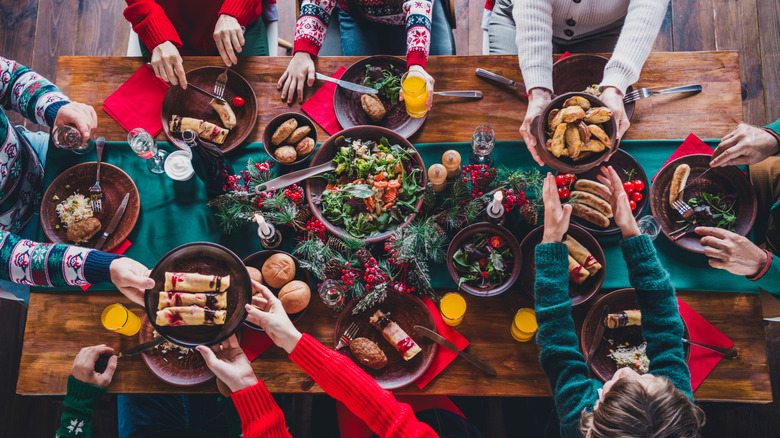
Roman Samborskyi/Shutterstock
The weather is starting to turn chilly, and the leaves are midway through falling off the trees in waves of gorgeous reds, yellows, and oranges. There’s a crisp scent to the air, and you’ve pulled your winter clothes out of storage. After a long, hot summer, you’re ready for the cold holiday season to officially begin. But have you started planning your Christmas or New Year’s meals yet? Christmas, especially, is one of the biggest holiday gatherings of the year for many families, and it’s never too early to start planning ahead for such an event. Most importantly, it’s never too early to start researching the mistakes people regularly make when cooking these holiday meals.
If this is your first time hosting the annual Christmas dinner, you’re probably frantically researching how to make it go smoothly. And even if you’re a seasoned pro, there are undoubtedly a few mistakes you’ve made in the past that you’ll want to avoid this year. There’s no shame in it because even chefs, bakers, and other cooking professionals can make a mistake here or there. The good news is that your research has brought you to the right place to start your event planning. From allergen mishaps to portion woes, here are 10 common mistakes to avoid when cooking this year’s holiday meal.
Waiting too long to do your holiday meal shopping
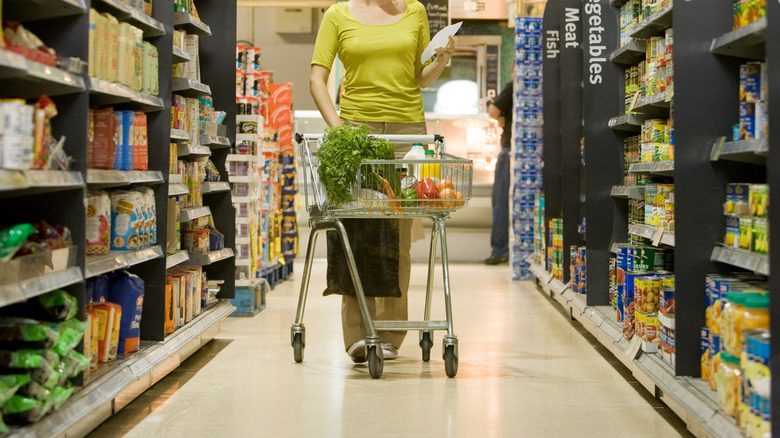
Image Source/Getty
Take a tip from Santa for this year’s holiday meals — make a list and check it twice. Your shopping list, that is. At least one to two weeks in advance of the meal you’re planning, sit down to create a detailed shopping list. It might be helpful to have a second person assisting with this task, allowing you to bounce ideas off each other. Once you’ve detailed all the ingredients necessary for your chosen Christmas dishes, take time to think about all of the extra things you’ll need. Examples of things that should be on the list include aluminum foil, seasonings, cling wrap, oil, butter, and disposable dishes, as applicable.
Once your list is complete, head to the store as early as possible to gather everything you need. You want this to be early enough that everything will be on hand the day of, but not so early that your food will spoil before it’s prepared. Aim for five to seven days ahead of time, which will give you ample time to run back to the store if you forget something essential. We suggest double-checking your shopping list against your grocery cart before checking out to reduce your chances of missing something.
Not enlisting help in advance
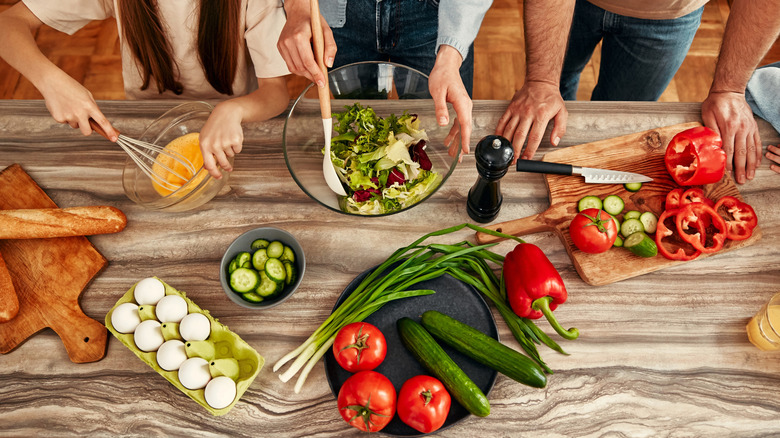
ORION PRODUCTION/Shutterstock
You don’t need to be a one-man show for this year’s holiday meal to be a success. In fact, trying to do everything on your own is counterproductive and just creates unnecessary stress. A better, more efficient option is to enlist help well in advance — ideally, a few weeks ahead of time, so you know what everyone is bringing before you create your own shopping list. While asking people to bring a dish is an excellent option, you could also opt to ask friends or relatives to stop in early to help with prep, cooking, and cleaning. Choose the option that works best for you.
A really helpful tip is to create a sign-up sheet or other centralized place to track what everyone is bringing or assisting with for your big holiday. This may be a virtual sign-up sheet, a group text message, an email thread, or even just a notebook on your kitchen counter. By tracking everyone’s contributions, you can ensure nobody is bringing the same thing and everything is covered without having to memorize these details. You’ll have a visual that tells you Aunt Sue is bringing the green bean casserole, Grandma will bring her deviled eggs, and so on. Plus, your loved ones will likely be more than happy to contribute to your shared feast.
Forgetting to declutter your kitchen
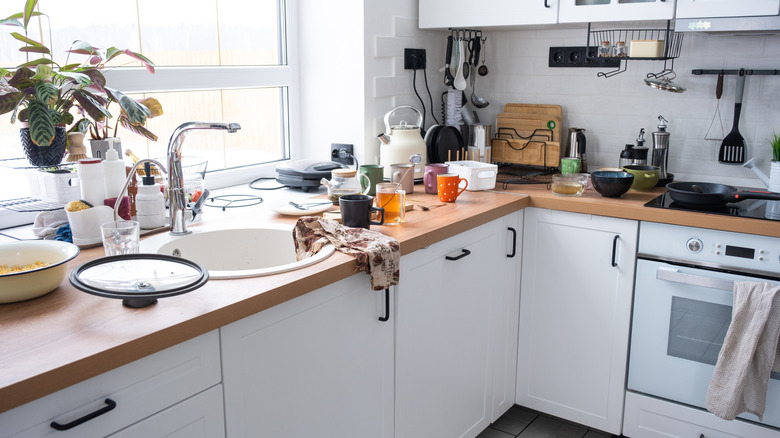
Simol1407/Shutterstock
Holiday meals take up a lot of space in your kitchen. Between prep work, cooking, and cooling, it’s easy for your kitchen to quickly become overwhelmed. But, thankfully, this is another thing you can prepare for in advance to alleviate some stress on the big day.
One of the simplest things to do is to declutter your kitchen counters. Put appliances away in hidden appliance nooks or cabinets when they aren’t in use. When doing this, keep in mind which appliances you might need to use for your holiday meal and ensure they’re still easily accessible. Depending on the size of your kitchen, you may also want to put up any decorations. Alternatively, if you have the room, you could consider putting a small table in the kitchen for extra working space.
Another idea is to have a designated place for food to go when it’s finished. This will help manage some of the chaos during your holiday meal prep and make the most use of the space available to you. If you wanted, you could also consider implementing hacks that make the most out of minimal kitchen cabinet space. This doesn’t have to be expensive, either — check out these Five Below kitchen finds that will help you declutter on a budget.
Failing to prep certain foods ahead of time
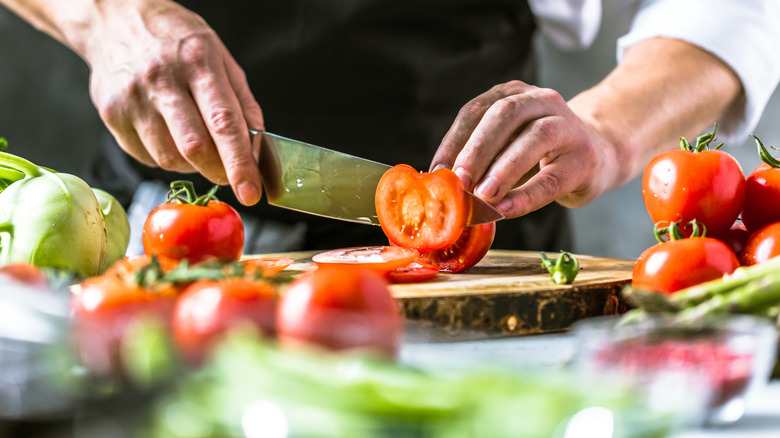
Karepastock/Getty
Since your kitchen isn’t a commercial operation, it’s unwise to think you can prepare and cook everything on the day of your holiday meal — and, if you do have a commercial-sized kitchen with helpers, we’re incredibly jealous. Small exceptions aside, you need to work with the size of the kitchen you have, and an easy way to do this is to prepare certain foods (or ingredients) ahead of time. This reduces stress and takes a lot of the pressure off your shoulders, so you can actually enjoy your holiday instead of spending it worried about the meal.
Most cold dishes can be prepared on Christmas Eve (or New Year’s Eve) and taste just fine the following day. Examples include potato salad, deviled eggs, coleslaw, fruit bowls, pudding, and even cakes or pies. Just be sure you’ve taken a few minutes to clean out and organize your refrigerator so there’s room to store everything. You could also take a few moments to prepare certain individual ingredients, like chopping onions, carrots, or celery.
Making too much (or too little) food
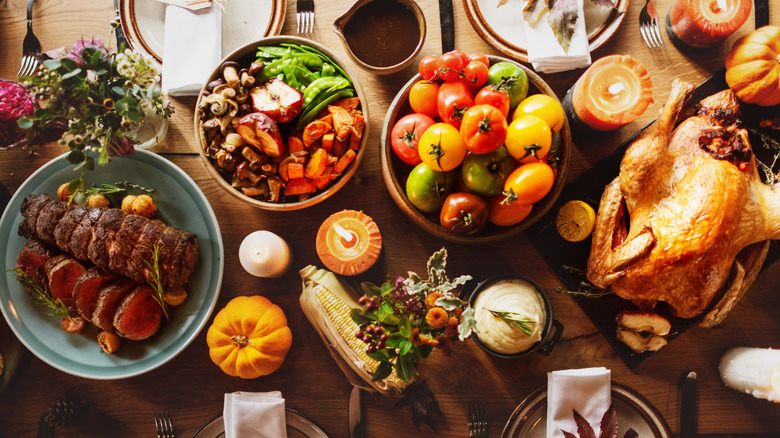
Rawpixel.com/Shutterstock
This is another area where advanced planning is crucial. If you want to avoid making too much or too little food, you need to know exactly how many people are on your guest list. While you may not send out formal invitations, it helps to gauge interest for meal attendance at least a month in advance. After all, some people may need to make travel plans or figure out lodging to attend your holiday meal. Double-check with would-be guests about a week ahead of time to confirm, right before you begin writing out your detailed shopping list.
Now, use that number to determine how many portions of food you need to make. It’s recommended to make slightly more than you think you’ll need on the day of, just in case an unexpected guest arrives or someone wants a third helping of their dish. Taking this into account, you should have plenty to feed your guests without going overboard. Everyone loves holiday leftovers, but those are only good for so many days, after all.
You should also pay attention to what your guests actually eat on the day of. Is there something that remains on the table without ever being finished? Consider nixing it from next year’s menu. Are there items that disappear as soon as they’re set down? It may be worthwhile to make extra for future holidays.
Forgetting to ask about allergies or dietary restrictions
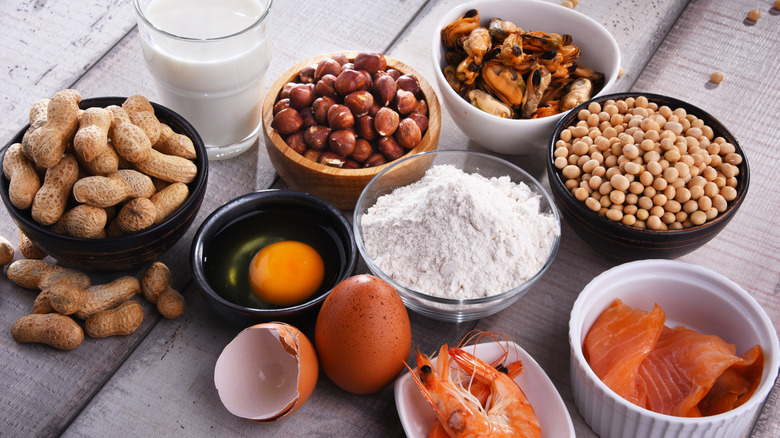
Monticelllo/Getty
A common mistake that can turn deadly is failing to ask about food allergies and dietary restrictions. For example, some food allergies can cause hives, difficulty breathing, or a serious life-threatening reaction called anaphylaxis. Dietary restrictions can run the gamut from immune reactions (like in the case of Celiac disease) to serious digestive upset (such as with lactose intolerance).
In any case, these reactions are things that you want to avoid at all costs during your holiday meal. For that reason, when taking RSVPs, make sure to ask your guests if they have any allergies or dietary restrictions you should be aware of. If they do, make a note about what those are and don’t be afraid to ask what happens when they come into contact with that food — this can help you understand if you merely need to be careful about cross-contamination or keep the food out of the house entirely during your holiday meal. By being proactive, you can help avoid any panic at the holiday table and ensure everyone has something appropriate to eat.
Failing to thaw your turkey completely ahead of time
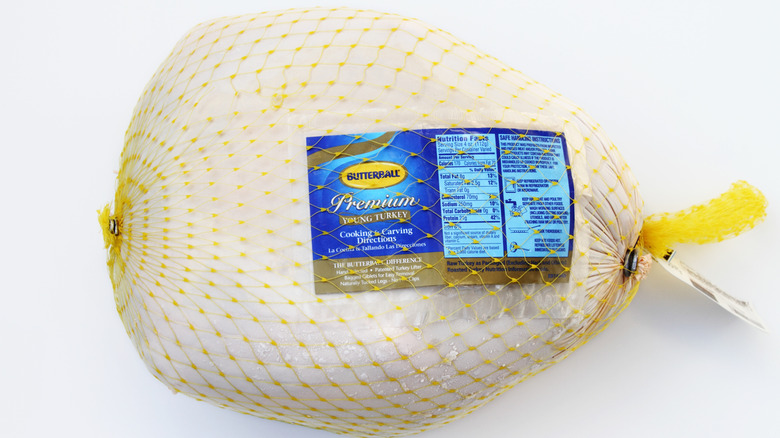
Noderog/Getty
Although many people choose ham for Christmas, there are still lots of people who opt for turkey — and it’s not uncommon to forget to thaw that turkey ahead of time. Unfortunately, failing to properly thaw the holiday bird completely before cooking it can result in some serious problems. For example, you run the risk of raw spots, uneven cooking, extended cooking time, or even an increased chance of food-borne illnesses. Obviously, these are all things you want to avoid during your big holiday meal.
Avoiding this mistake takes several days of advance planning. The recommended method for thawing a turkey is in the refrigerator, where guidelines state that you should allow approximately one day per 4 pounds of turkey. So, if you have a 10-pound frozen turkey, you’ll need to put it in the fridge two and a half days in advance. A 15-pound turkey would require three days of thaw time in the refrigerator, and so on.
Not timing the dishes properly to be done at the same time
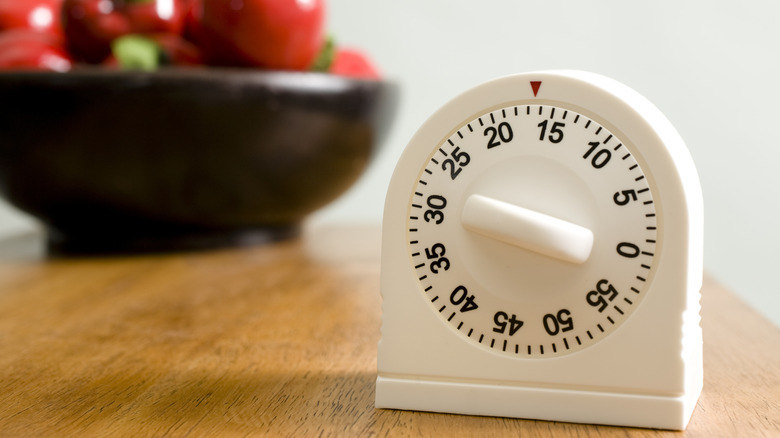
Fstop123/Getty
Not timing the dishes properly is a very common mistake that can quickly lead to a subpar holiday meal experience — and a whole lot of headaches for you. Improper dish timing can lead to overcooking, undercooking, or certain foods becoming cold before you have a chance to eat them. Thankfully, there are several great ways to ensure your food comes out with restaurant-perfect timing.
The most important tip is to know your recipes. Understand how long each dish will take to cook and, if you don’t already know the answer, do a little research to figure it out. Prepping ahead of time (as mentioned earlier) can also help with this endeavor. Another key consideration is the amount of space you have in your oven or on your stovetop at any given time.
Once you’ve figured out all the variables, design a system that works for you. Some people may find that creating a cooking schedule for Christmas Day is helpful. Others may prefer a flowchart to help track work. When you figure out the best system for you, using timers can help you stay on track.
Overcomplicating the menu
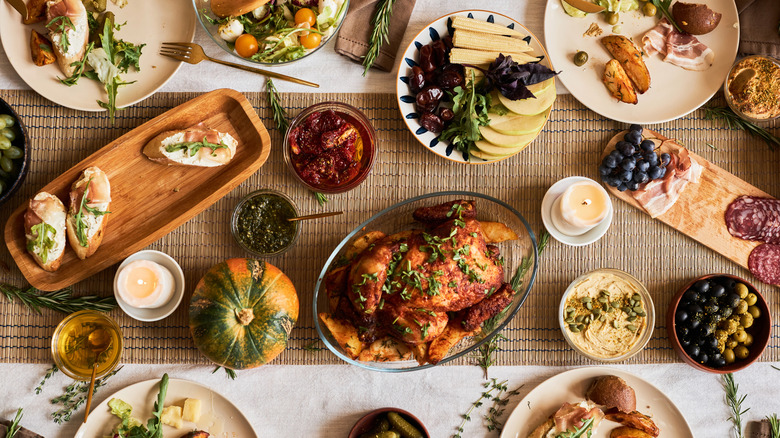
Seventyfour/Getty
It can be really tempting to try a brand new recipe on Christmas or New Year’s that you just know everyone will love … if it turns out right. It’s also easy to fall into the trap of creating an elaborate holiday meal with dozens of dishes in an effort to make things feel extra special. While these are nice thoughts, they often turn out to be counterintuitive. In fact, it’s best to keep it as simple as possible. Since they’re such a big meal, holiday menus can take a lot of time and effort even when staying simple — and you really want to make things as easy as possible to avoid any significant mistakes.
If you’re really deadset on trying something new, opt for a single new starter recipe. This won’t take too much of your time, and it won’t be a complete disaster if it doesn’t come out quite right. Even better if it’s a cold starter recipe that can be prepped the night before, so it doesn’t throw off your cooking schedule on the big day.
Not cleaning the kitchen as you go
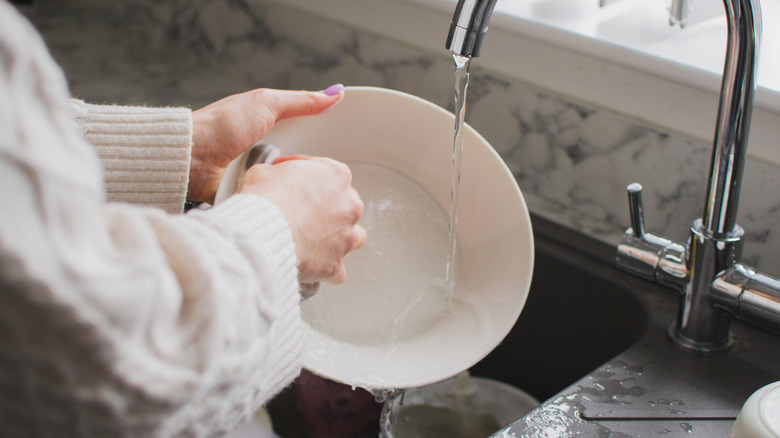
Iryna Marienko/Shutterstock
Not cleaning the kitchen as you go is one of the most common mistakes you’ll want to avoid when cooking this year’s holiday meal. It leads to incredible chaos and overwhelm once the meal’s over. There’s no reason to stay in the kitchen for one or two hours after eating just to make sure things are tidied — most of this can be taken care of while you cook, especially if you enlist the help of your friends and family.
When cooking your holiday meal, there will be a lot of tiny lulls in the work. During those five minutes here and 10 minutes there, accomplish a few cleaning tasks that need to be done. For example, you could finish loading the dishwasher while you wait for your traditional cornbread to come out of the oven, or wipe off the counters while the onions finish sautéing. These little efforts make a huge difference over the course of the day. It’s even better if you have a kitchen helper because they can tackle these tasks while you prep or cook.
Keeping your surfaces clean throughout the day is especially important. Between every food item handled, you should be wiping the used surface (and also washing your hands). Not only does this make clean-up easier, but it also helps prevent food poisoning and other food-borne illnesses.

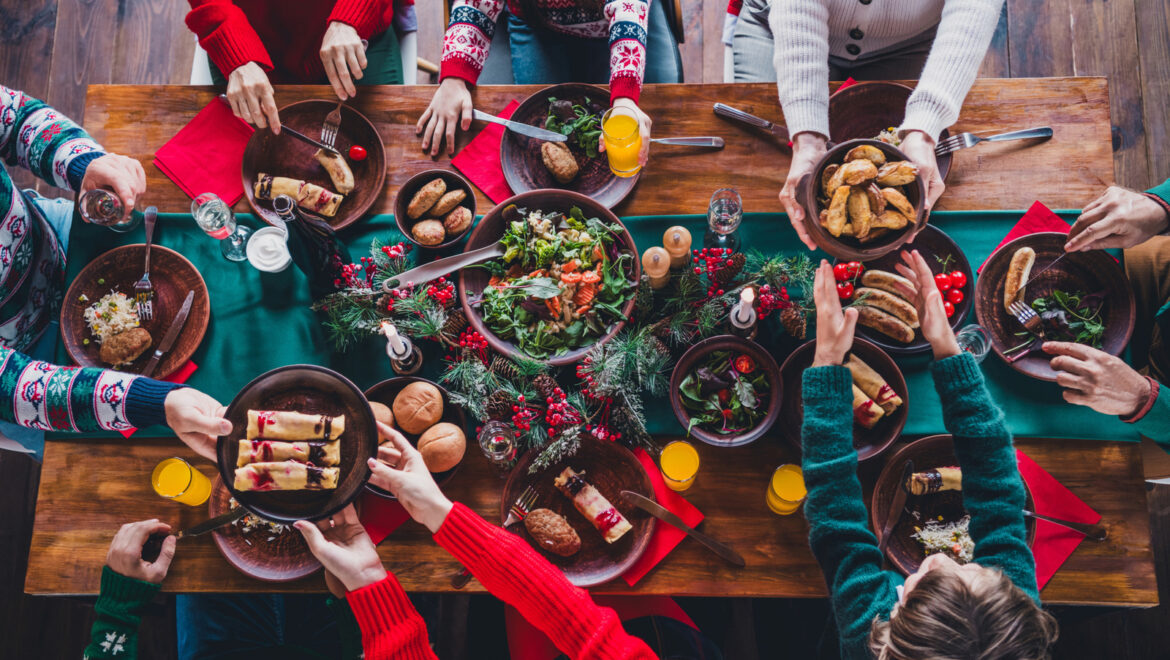
Dining and Cooking